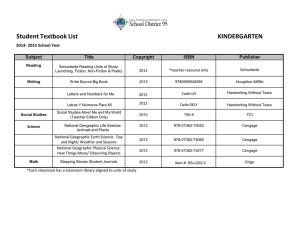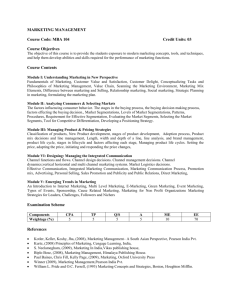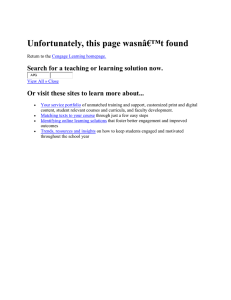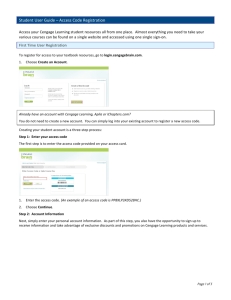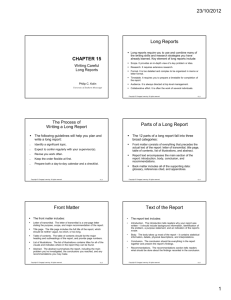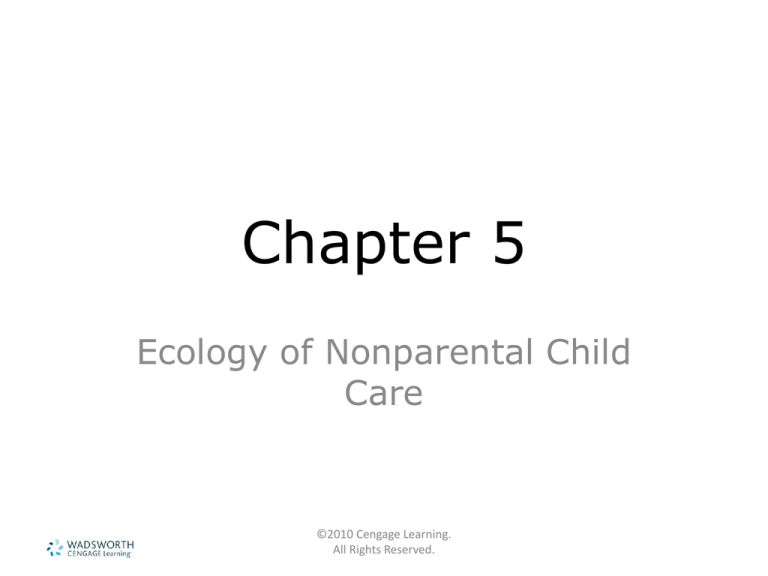
Chapter 5
Ecology of Nonparental Child
Care
©2010 Cengage Learning.
All Rights Reserved.
Give a little love to a child, and
you get a great deal back.
John Ruskin
©2010 Cengage Learning.
All Rights Reserved.
Nonparental Child
Care
©2010 Cengage Learning.
All Rights Reserved.
Indicators of Quality
• Smaller overall group size
• Fewer children per adult
– Caregiver-to-child ratio
• Caregivers with specialized training
in child development or early
childhood education
©2010 Cengage Learning.
All Rights Reserved.
Indicators of Concern
• Caregivers with little or inadequate
training and education
• High staff turnover (25-50% each
year)
• Low wages with few benefits
©2010 Cengage Learning.
All Rights Reserved.
Macrosystem
Influences
©2010 Cengage Learning.
All Rights Reserved.
Macrosystem
• Political ideology
• Economics
• Science/technology
©2010 Cengage Learning.
All Rights Reserved.
Macrosystem
• Child care functions:
– Social service
– For enrichment
– For employability
– As an intervention
– For school readiness
©2010 Cengage Learning.
All Rights Reserved.
Chronosystem
Influences
©2010 Cengage Learning.
All Rights Reserved.
Research Trends
Attachment
• Spitz
• Bowlby
• Skeels
Concerns
about fulltime care
• Belsky
©2010 Cengage Learning.
All Rights Reserved.
Further
analysis
• Phillips &
Howes
• Lamb &
Ahnert
Research Findings
• Social Development
– Children who have experience in child
care programs are more socially
competent than those who have not had
such experience.
©2010 Cengage Learning.
All Rights Reserved.
Research Findings
• Cognitive Development
– The intellectual performance of children
who attend a quality child care program
is higher than that of children from
similar backgrounds who do not attend
a child care program or who attend one
of poor quality.
©2010 Cengage Learning.
All Rights Reserved.
Mesosystem
Influences
©2010 Cengage Learning.
All Rights Reserved.
Mesosystem Influences
• School and Community Involvement
– Extended day care
• Government and Business
Involvement
©2010 Cengage Learning.
All Rights Reserved.
Nonparental Child
Care and
Socialization
©2010 Cengage Learning.
All Rights Reserved.
Curriculum Models
• Teacher-directed curriculum
– A curriculum in which the learning
activities are planned by the teacher for
all the children
• Learner-directed curriculum
– A curriculum in which the learning
activities emerge from individual
interests and teacher guidance
©2010 Cengage Learning.
All Rights Reserved.
Curriculum Models
• Cognitively Oriented
– Represents an application of Piaget’s
theory to an educational setting
• Direct Instruction
– Based on behaviorist principles
©2010 Cengage Learning.
All Rights Reserved.
Curriculum Models
• Montessori
– Based on individual self-directed
learning with the teacher as facilitator
• Developmental Interaction
– Individualized in relation to each child’s
stage of development while providing
social interaction
©2010 Cengage Learning.
All Rights Reserved.
Piaget’s Theory of Cognitive
Development
Stage
Age
Characterization
Sensorimotor
Birth-2
Preoperational
2-7
Concrete
operational
Formal
operational
7-11
Thinking is
action
Thinking based
on appearances
Thinking based
on reality
Thinking based
on abstractions
11+
©2010 Cengage Learning.
All Rights Reserved.
Maltreatment
Indicators
©2010 Cengage Learning.
All Rights Reserved.
Indicators
• Physical Abuse
• Bruises
• Burns
• Fractures and other
injuries
• Unexplained behavior
patterns
• Tardiness
• Aggression
• Restlessness
©2010 Cengage Learning.
All Rights Reserved.
Indicators
• Physical Neglect
• Hunger, poor hygiene
• Inappropriate dress
for weather
• Unattended physical
or medical needs
• Lack of supervision
• Alcohol, drug abuse,
begging, stealing food
• Constant fatigue,
listlessness, or sleep
©2010 Cengage Learning.
All Rights Reserved.
Indicators
• Sexual Abuse
and Exploitation
• Difficulty walking or
sitting
• Complaints of pain or
itching
• Bruises, bleeding,
venereal disease
• Bizarre, unusual, or
sophisticated sexual
knowledge or behavior
• Fear, withdrawal,
clinging, regression
©2010 Cengage Learning.
All Rights Reserved.
Indicators
• Emotional Abuse
• Withdrawn,
depressed, apathetic
behavior
• Antisocial or “acting
out” behavior
• Displaying other signs
of emotional turmoil
• Unwittingly making
comments about one’s
own behavior
©2010 Cengage Learning.
All Rights Reserved.
Maltreatment
• Emotional
Deprivation
• Speech disorders
• Lag in physical
development, frailty,
refusal to eat
• Failure to thrive
• Habit disorders
• Attention, suicide,
destructive behaviors
• Behavioral extremes
• Hysterias, phobias,
compulsive traits
©2010 Cengage Learning.
All Rights Reserved.

